List of active Japan Maritime Self-Defense Force ships
List of active ships of the Japan Maritime Self-Defense Force is a list of ships in active service with the Japan Maritime Self-Defense Force. The JMSDF is one of the world's largest navies and the second largest navy in Asia in terms of fleet tonnage.[1] As of 2016, the JMSDF operates a total of 155 vessels (including minor auxiliary vessels), including; four helicopter destroyers (or helicopter carriers), 26 destroyers, 10 small destroyers (or frigates), six destroyer escorts (or corvettes), 22 attack submarines, 30 mine countermeasure vessels, six patrol vessels, three landing ship tanks, 8 training vessels and a fleet of various auxiliary ships.[2][3]

As of 2013, a procurement list added to the current National Defense Program Guidelines (NDPG) has revealed that, among other things, an additional 48 escort vessels of various classes are planned to be added to the MSDF fleet in the coming decade.[4] In addition, as of 7 July 2013, it was being reported that plans were under way to procure two more Aegis equipped destroyers in order to bolster ongoing BMD efforts, the first to be contracted for in fiscal year 2015 and the other in fiscal year 2016.[5]
Submarine fleet
Submarines
The JMSDF plans to increase the number of submarines from the current number to 22 boats.[6]
| Class | Picture | Type | Boats | Displacement | Note |
|---|---|---|---|---|---|
| Submarines (20 in Service) | |||||
| Taigei-class |  |
Attack submarine | JS Taigei | 3,000 tonnes (surfaced) | The first submarine of this class, Taigei, will be converted to a test submarine in March 2022. The Taigei class will be operated as an attack submarine from the second boat.[7] Two additional boats not yet launched (October 2020). |
| Sōryū-class | _arrives_at_Joint_Base_Pearl_Harbor-Hickam_for_a_scheduled_port_visit%252C_-6_Feb._2013_(YP255-023).jpg.webp) |
JS Sōryū JS Unryū JS Hakuryū JS Kenryū JS Zuiryū JS Kokuryū JS Jinryū JS Sekiryū JS Seiryū JS Shōryū JS Ōryū JS Tōryū |
2,900 tonnes (surfaced) 4,200 tonnes (submerged) |
The JS Ōryū is world's first submarine powered by lithium-ion batteries.[8] JS Tōryū, which is scheduled to be commissioned in March 2021, is the last of the Soryu-class ships. | |
| Oyashio-class |  |
JS Uzushio JS Makishio JS Isoshio JS Narushio JS Kuroshio JS Takashio JS Yaeshio JS Setoshio JS Mochishio |
2,750 tonnes (surfaced) 4,000 tonnes (submerged) |
2 of 11 built converted to training ships (see Training Vessels below). | |
Surface fleet
Multi-purpose operation destroyers - DDH (de facto light aircraft carrier)
| Class | Picture | Type | Ships | Displacement | Note |
|---|---|---|---|---|---|
| Multi-purpose operation destroyers - DDH (2 in Service) | |||||
| Izumo-class |  |
Multi-purpose operation destroyer (de facto aircraft carrier) | JS Izumo JS Kaga |
27,000 tonnes | Re-designated from helicopter destroyer to Multi-purpose operation destroyer following announcement that they will operate F-35B STOVL Aircraft.[9] |
Helicopter destroyers - DDH (de facto helicopter carrier)
| Class | Picture | Type | Ships | Displacement | Note |
|---|---|---|---|---|---|
| Helicopter destroyers - DDH (2 in Service) | |||||
| Hyūga-class | .jpg.webp) |
Helicopter destroyer (or helicopter carrier) | JS Hyūga JS Ise |
19,000 tonnes | |
Landing ships
| Class | Picture | Type | Ships | Displacement | Note |
|---|---|---|---|---|---|
| Landing ships - LST (3 in Service) | |||||
| Ōsumi-class |  |
Landing ship tank (de facto Amphibious transport dock) | JS Ōsumi JS Shimokita JS Kunisaki |
14,000 tonnes | The Japanese MoD is planning to perform a major refit on the Osumi-class to improve their amphibious capabilities.[10] |
| Landing craft - LCU (9 in Service) | |||||
| LCU-2001-class |  |
Utility landing craft | JS LC No.1 JS LC No.2 |
540 tonnes | |
| YL-09-class |  |
landing craft mechanized | JS YL-11 JS YL-12 JS YL-13 JS YL-14 JS YL-15 JS YL-16 JS YL-17 |
50 tonnes | |
Destroyers - DDG/DD
The JMSDF uses the official term Destroyers despite some larger ships being analogous to cruisers and smaller vessels being analogues of frigates by most international classifications.[11]
| Class | Picture | Type | Ships | Displacement | Note |
|---|---|---|---|---|---|
| Destroyers - DDG/DD (37 in Service) | |||||
| Maya-class |  |
Guided missile destroyer (Aegis) | JS Maya JS Haguro |
10,500 tonnes | JS Haguro is expected to be in commission by 2021. |
| Atago-class |  |
JS Atago JS Ashigara |
10,000 tonnes | ||
| Kongō-class | 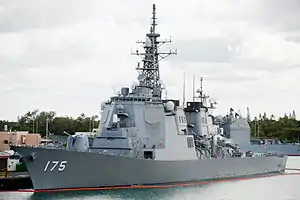 |
JS Kongō JS Kirishima JS Myōkō JS Chōkai |
9,500 tonnes | ||
| Hatakaze-class | _is_participating_in_exercise_Keen_Sword_2011.jpg.webp) |
Guided missile destroyer | JS Shimakaze | 5,900 tonnes | |
| Asahi-class |  |
Destroyer | JS Asahi JS Shiranui |
6,800 tonnes | |
| Akizuki-class | .jpg.webp) |
JS Akizuki JS Teruzuki JS Suzutsuki JS Fuyuzuki |
6,800 tonnes | ||
| Takanami-class | %252C_19_May_2007_b.jpg.webp) |
JS Takanami JS Onami JS Makinami JS Sazanami JS Suzunami |
6,300 tonnes | ||
| Murasame-class |  |
JS Murasame JS Harusame JS Yūdachi JS Kirisame JS Inazuma JS Samidare JS Ikazuchi JS Akebono JS Ariake |
6,100 tonnes | ||
| Asagiri-class | _in_the_Pacific%252C_-16_Nov._2007_a.jpg.webp) |
JS Asagiri JS Yamagiri JS Yūgiri JS Amagiri JS Hamagiri JS Setogiri JS Sawagiri JS Umigiri |
4,900 tonnes | ||
| Hatsuyuki-class |  |
JS Matsuyuki | 4,000 tonnes | ||
Frigate Multi-Purpose/Mine - FFM
| Class | Picture | Type | Ships | Displacement | Note |
|---|---|---|---|---|---|
| Frigate Multi-Purpose/Mine - FFM (0 in Service) | |||||
| 30FFM-class | _left_front_view_at_Mitsui_Engineering_%2526_Shipbuilding_Tamano_Shipyard_November_19%252C_2020_03.jpg.webp) |
Frigate | JS Kumano | 5,500 tonnes | On November 19, 2020, FFM-2 Kumano was launched. The ship class name derived from FFM-1 is not disclosed due to the delay of the construction of FFM-1. |
Destroyer escorts - DE
| Class | Picture | Type | Ships | Displacement | Note |
|---|---|---|---|---|---|
| Destroyer escorts - DE (6 in Service) | |||||
| Abukuma-class | 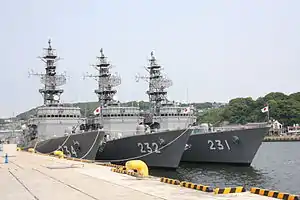 |
Destroyer escort (or frigate) | JS Abukuma JS Jintsū JS Ōyodo JS Sendai JS Chikuma JS Tone |
2,550 tonnes | |
Mine countermeasure vessels
| Class | Picture | Type | Ships | Displacement | Note |
|---|---|---|---|---|---|
| Mine countermeasure vessels (21 in Service) | |||||
| Uraga-class |  |
Minesweeper | JS Uraga JS Bungo |
5,500 tonnes | Categorized as "mine-countermeasures support ship". |
| Awaji-class |  |
JS Awaji JS Hirado |
690 tonnes | JS Etajima will be commissioned in March 2021. | |
| Enoshima-class |  |
JS Enoshima JS Chichijima JS Hatsushima |
570 tonnes | ||
| Hirashima-class |  |
JS Hirashima JS Yakushima JS Takashima |
570 tonnes | ||
| Sugashima-class | 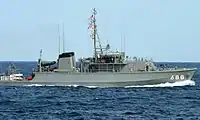 |
JS Sugashima JS Tsunoshima JS Naoshima JS Toyoshima JS Ukushima JS Izushima JS Aishima JS Aoshima JS Miyajima JS Shishijima JS Kuroshima |
570 tonnes | ||
Patrol vessels
| Class | Picture | Type | Ships | Displacement | Note |
|---|---|---|---|---|---|
| Patrol vessels (6 in Service) | |||||
| Hayabusa-class |  |
Patrol boat | JS Hayabusa JS Wakataka JS Otaka JS Kumataka JS Umitaka JS Shirataka |
240 tonnes | |
Training vessels
| Class | Picture | Type | Ships | Displacement | Note |
|---|---|---|---|---|---|
| Training vessels (8 in Service) | |||||
| Kashima-class |  |
Cadet training ship | JS Kashima | 4,050 tonnes | |
| Shimayuki-class |  |
Training vessel | JS Shimayuki JS Setoyuki |
3,000 tonnes | Reconverted Hatsuyuki-class destroyers. |
| Hatakaze-class | _is_participating_in_exercise_Keen_Sword_2011.jpg.webp) |
JS Hatakaze | 5,900 tonnes | Converted Hatakaze-class guided missile destroyer. | |
| Oyashio-class |  |
Training submarine | JS Oyashio JS Michishio |
4,000 tonnes | Reconverted Oyashio-class submarines. |
| Kurobe-class |  |
Training support ship | JS Kurobe | ||
| Tenryū-class |  |
JS Tenryū | |||
Auxiliary fleet
Replenishment ships
| Class | Picture | Type | Ships | Displacement | Note |
|---|---|---|---|---|---|
| Replenishment ships (5 in Service) | |||||
| Mashū-class |  |
Replenishment oiler | JS Mashū JS Ōmi |
25,000 tonnes | |
| Towada-class |  |
JS Hamana JS Tokiwa JS Towada |
15,000 tonnes | ||
Miscellaneous
| Class | Picture | Type | Ships | Displacement | Note |
|---|---|---|---|---|---|
| Miscellaneous (16 in Service) | |||||
| Hiuchi-class |  |
Training support ship | JS Hiuchi JS Suo JS Amakusa JS Genkai JS Enshu |
1,000 tonnes | |
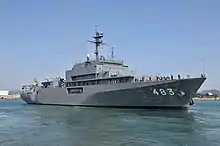 |
Cable laying ship | JS Muroto | |||
_left_side_view_at_Kawasaki_Heavy_Industries_Kobe_Shipyard_November_11%252C_2017.jpg.webp) |
Submarine rescue vessel | JS Chiyoda | 5,600 tonnes (standard) | JMSDF commissions new submarine rescue ship[12] | |
_at_Honolulu%252C_-8_Nov._2001_a.jpg.webp) |
JS Chihaya | 6,900 tonnes | |||
| Futami-class |  |
Oceanographic research ship | JS Wakasa | ||
.jpg.webp) |
JS Nichinan | ||||
 |
JS Shōnan | ||||
| Hibiki-class | .jpg.webp) |
Ocean surveillance ship | JS Hibiki JS Harima JS Aki[13] |
JS Aki is expected to be in commission by March 2021.[14] | |
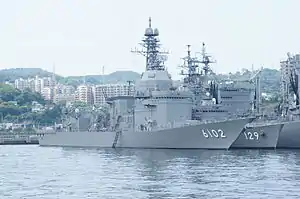 |
Experiment ship | JS Asuka | |||
 |
Ice breaker | JS Shirase | 20,000 tonnes | ||
.jpg.webp) |
Yacht | JS Hashidate | |||
Future JMSDF vessels
- In 2014, Japanese Defense Minister Itsunori Onodera expressed the intention of buying one amphibious assault ship from the United States to provide more amphibious capabilities than the current Osumi class landing ships. The Wasp-class amphibious assault ship is most likely candidate for acquisition.[15]
- In 2020, Japanese Defense Minister Nobuo Kishi announces plan to build 2 new Aegis destroyers to replace scrapped land-based missile interceptors. [16]
See also
- Hatakaze (destroyer)
References
- IISS 2010, Japanese Maritime Self-Defense Force
- "Escort ship". Archived from the original on 23 December 2014. Retrieved 24 December 2014.
- "Submarine (vessels)". Archived from the original on 22 December 2014. Retrieved 24 December 2014.
- "EDITORIAL: Defense Ministry's 'shopping list' needs a radical review". AJW by The Asahi Shimbun. Archived from the original on 24 December 2014. Retrieved 24 December 2014.
- Japan eyes two new Aegis destroyers to counter N. Korea missile threat Archived 8 July 2013 at the Wayback Machine Japan Times, 7 July 2013
- "Japanese Ministry of Defense website, 2015 Defense Budget" (PDF). Archived from the original (PDF) on 4 March 2016. Retrieved 14 May 2015.
- "防衛計画の大綱 中期防衛力整備計画" (PDF). Ministry of Defense (Japan). 2019. Retrieved 11 January 2020.
- Japan commissions first Sōryū-class submarine equipped with lithium-ion batteries Jane's, 05 March 2020
- "Japan avoids flak by refusing to call flattop 'aircraft carrier':The Asahi Shimbun". The Asahi Shimbun. Archived from the original on 26 May 2019. Retrieved 26 May 2019.
- "readdailynews.com". readdailynews.com. Archived from the original on 22 January 2014. Retrieved 6 September 2017.
- John Pike. "Japanese Warships - Equipment Holdings". Archived from the original on 26 February 2015. Retrieved 24 December 2014.
- "JMSDF commissions new submarine rescue ship". 20 March 2018. Archived from the original on 23 March 2018. Retrieved 23 March 2018.
- Dominguez, Gabriel (3 February 2020). "Japan launches third Hibiki-class ocean surveillance ship". Jane's Information Group.
- "JMSDF orders third, more advanced, Hibiki-class ship". 21 May 2018. Archived from the original on 22 May 2018. Retrieved 22 May 2018.
- "Onodera sets out plans to buy amphibious assault ships". Archived from the original on 26 July 2014. Retrieved 24 December 2014.
- "Japan Defense Ministry plans new Aegis destroyers in place of Aegis Ashore". Archived from the original on 1 December 2020. Retrieved 29 December 2020.